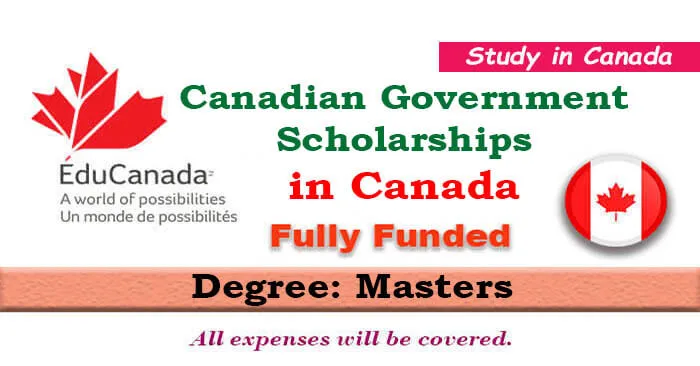Advertisements
Government scholarships in Canada play a pivotal role in promoting higher education, fostering research and innovation, and attracting top talent from around the world. These scholarships are typically funded and administered by government agencies, departments, or ministries at the federal, provincial, and territorial levels. They aim to support students at various academic levels, from undergraduate to postdoctoral, across a wide range of fields and disciplines.
The Significance of Government Scholarships
Government scholarships play a crucial role in promoting education, research, and innovation while fostering socio-economic development and global cooperation. Their significance extends beyond individual recipients to encompass broader societal benefits and national priorities. Here are some key aspects highlighting the significance of government scholarships:
- Accessible Education: Government scholarships make higher education more accessible to a diverse range of students, including those from disadvantaged backgrounds or underrepresented communities. By providing financial support for tuition fees, living expenses, and other educational costs, these scholarships help alleviate financial barriers and ensure that talented individuals have the opportunity to pursue their academic aspirations.
- Merit-Based Recognition: Government scholarships recognize and reward academic excellence, research potential, leadership qualities, and other achievements among students. By offering merit-based awards, governments encourage and motivate students to excel in their studies, pursue intellectual curiosity, and strive for personal and professional growth.
- Investment in Talent Development: Government scholarships represent an investment in human capital and talent development. By supporting students at various academic levels, from undergraduate to postdoctoral, governments nurture the next generation of leaders, innovators, researchers, and professionals who will contribute to the advancement of society and address pressing global challenges.
- Research and Innovation: Many government scholarships prioritize funding for research-intensive disciplines and projects that drive innovation, knowledge creation, and technological advancement. By supporting research activities, governments stimulate scientific discovery, foster interdisciplinary collaboration, and promote the development of solutions to complex societal problems.
- Internationalization and Global Engagement: Government scholarships facilitate internationalization efforts by attracting top talent from around the world to study, conduct research, and collaborate in Canada. By welcoming international students and researchers, governments promote cultural exchange, diversity, and cross-cultural understanding, while also strengthening diplomatic relations and building people-to-people ties with partner countries.
- Capacity Building and Sustainable Development: Government scholarships contribute to capacity building and sustainable development efforts, particularly in developing countries and emerging economies. By providing opportunities for students and professionals to acquire knowledge, skills, and expertise in critical areas such as healthcare, education, agriculture, and environmental sustainability, governments empower individuals and communities to drive positive change and achieve long-term prosperity.
- Promotion of Excellence and Competitiveness: Government scholarships raise the profile of educational institutions, research centers, and innovation hubs in Canada by attracting top-tier students and researchers from around the world. By showcasing excellence in education and research, governments enhance the competitiveness of Canadian institutions on the global stage and position Canada as a destination of choice for academic and scientific pursuits.
In summary, government scholarships serve as catalysts for educational advancement, research excellence, and socio-economic development. They provide opportunities for individuals to realize their full potential, contribute to the advancement of knowledge and innovation, and make meaningful contributions to society. By investing in education and talent development through scholarships, governments lay the foundation for a brighter future and a more prosperous and equitable world.
Benefits of Government Scholarships
Government scholarships offer a plethora of benefits to both individual recipients and society as a whole. These scholarships play a vital role in promoting education, fostering research and innovation, and addressing socio-economic disparities. Here are some key benefits of government scholarships:
- Increased Access to Education: Government scholarships make higher education more accessible to a diverse range of students, including those from disadvantaged backgrounds or underrepresented communities. By providing financial assistance for tuition fees, living expenses, and other educational costs, scholarships help remove financial barriers and ensure that talented individuals have the opportunity to pursue their academic aspirations.
- Recognition of Merit and Achievement: Government scholarships recognize and reward academic excellence, research potential, leadership qualities, and other achievements among students. By offering merit-based awards, scholarships encourage students to strive for excellence in their studies, pursue intellectual curiosity, and achieve their full potential.
- Support for Research and Innovation: Many government scholarships prioritize funding for research-intensive disciplines and projects that drive innovation, knowledge creation, and technological advancement. By supporting research activities, scholarships stimulate scientific discovery, foster interdisciplinary collaboration, and promote the development of solutions to complex societal challenges.
- Global Talent Attraction and Retention: Government scholarships attract top talent from around the world to study, conduct research, and work in Canada. By welcoming international students and researchers, scholarships contribute to cultural exchange, diversity, and cross-cultural understanding, while also strengthening diplomatic relations and building people-to-people ties with partner countries.
- Promotion of Socio-Economic Mobility: Government scholarships empower individuals from all socio-economic backgrounds to pursue higher education and career opportunities. By investing in education and talent development, scholarships help break the cycle of poverty, promote social mobility, and create pathways to economic prosperity for individuals and communities.
- Investment in Human Capital: Government scholarships represent an investment in human capital and talent development. By supporting students at various academic levels, from undergraduate to postdoctoral, scholarships nurture the next generation of leaders, innovators, researchers, and professionals who will contribute to the advancement of society and address pressing global challenges.
- Enhanced Competitiveness and Innovation: Government scholarships raise the profile of educational institutions, research centers, and innovation hubs by attracting top-tier students and researchers. By showcasing excellence in education and research, scholarships enhance the competitiveness of Canadian institutions on the global stage and position Canada as a leader in innovation and knowledge creation.
- Long-Term Economic Growth and Development: Government scholarships contribute to long-term economic growth and development by fostering a highly skilled workforce, promoting entrepreneurship and innovation, and driving technological advancement. By investing in education and research through scholarships, governments lay the foundation for a knowledge-based economy and a prosperous future for all citizens.
In summary, government scholarships offer numerous benefits that extend beyond individual recipients to encompass broader societal impacts. By investing in education, talent development, and research, governments can create a more equitable, innovative, and prosperous society for current and future generations.
Types of Government Scholarships
Eligibility Criteria
Eligibility criteria for government scholarships vary depending on the specific scholarship program, funding source, and intended recipients. However, there are some common eligibility criteria that applicants may need to meet to qualify for government scholarships. These criteria may include:
- Academic Excellence: Many government scholarships require applicants to demonstrate academic excellence through high grades or academic achievements. This may include maintaining a minimum GPA or academic standing, receiving academic awards or honors, or excelling in standardized tests.
- Educational Background: Applicants may need to meet certain educational requirements, such as being enrolled in or accepted to an accredited educational institution, program, or course of study. Some scholarships may be limited to students pursuing specific academic disciplines or fields of study.
- Citizenship or Residency: Some government scholarships are open only to citizens or permanent residents of a particular country or jurisdiction. Others may be available to international students or individuals from specific regions or countries as part of international cooperation or development initiatives.
- Financial Need: Need-based scholarships may require applicants to demonstrate financial need by providing information about their family income, assets, and financial circumstances. Financial need criteria help ensure that scholarships are awarded to those who require financial assistance to pursue their education.
- Research or Career Goals: Scholarships aimed at supporting research or career development may require applicants to outline their research interests, career goals, and objectives. This helps assess the alignment between the applicant’s aspirations and the scholarship’s objectives.
- Community Involvement and Leadership: Some scholarships value applicants’ involvement in extracurricular activities, community service, volunteer work, or leadership roles. Demonstrating active participation in community or school activities can strengthen an applicant’s candidacy.
- Letters of Recommendation: Applicants may need to submit letters of recommendation from teachers, professors, employers, or other individuals who can attest to their academic abilities, character, and potential. These letters provide insight into the applicant’s qualifications and suitability for the scholarship.
- Essay or Personal Statement: Many scholarships require applicants to submit an essay, personal statement, or research proposal outlining their academic and career goals, reasons for applying, and relevant experiences. This allows applicants to demonstrate their writing skills, motivation, and passion for their chosen field of study.
- Language Proficiency: For scholarships offered in countries where English or another language is the medium of instruction, applicants may need to demonstrate proficiency in that language through standardized tests such as the TOEFL or IELTS.
- Adherence to Application Instructions: Applicants must carefully review and adhere to the scholarship’s application instructions, including deadlines, document requirements, and submission procedures. Failure to follow instructions may result in disqualification from consideration.
It’s essential for prospective applicants to thoroughly review the eligibility criteria for each scholarship they plan to apply for and ensure that they meet all requirements before submitting their application. Meeting eligibility criteria is the first step toward securing a government scholarship to support one’s educational and career aspirations.
The Application Process
The application process for government scholarships typically involves several steps, each designed to assess applicants’ qualifications, suitability, and potential for success. While specific procedures may vary depending on the scholarship program and funding source, the following steps are commonly involved in the application process:
- Research Scholarship Opportunities: Begin by researching government scholarship opportunities available in your country or region. Explore scholarship databases, government websites, educational institutions, and other sources to identify scholarships that align with your academic interests, career goals, and eligibility criteria.
- Review Eligibility Criteria: Carefully review the eligibility criteria for each scholarship to ensure that you meet the requirements. Pay attention to criteria such as academic excellence, citizenship or residency status, field of study, financial need, and other relevant factors.
- Gather Required Documents: Collect all necessary documents and materials required for the scholarship application. These may include transcripts, letters of recommendation, a personal statement or essay, a research proposal (if applicable), standardized test scores, proof of citizenship or residency, and any other supporting documents specified in the application guidelines.
- Prepare Application Materials: Complete all required application forms and prepare your application materials according to the scholarship’s guidelines. Pay close attention to formatting requirements, word limits, and any specific instructions provided by the scholarship provider.
- Submit Application: Submit your completed application along with all required documents by the specified deadline. Be sure to follow the submission instructions provided by the scholarship provider, whether it’s through an online application portal, email, or postal mail.
- Track Application Status: Keep track of your application status and monitor any communications from the scholarship provider regarding your application. Be prepared to respond promptly to any requests for additional information or documentation.
- Attend Interviews or Examinations: Some scholarship programs may require applicants to participate in interviews, examinations, or selection committees as part of the evaluation process. If selected for an interview or examination, prepare thoroughly and demonstrate your qualifications and suitability for the scholarship.
- Await Notification: After submitting your application, await notification from the scholarship provider regarding the outcome of your application. This may include acceptance, rejection, or placement on a waitlist. Be patient and proactive in following up on your application status if necessary.
- Accept Scholarship Offer: If you are awarded a scholarship, carefully review the terms and conditions of the award, including any requirements, obligations, or restrictions associated with the scholarship. Accept the scholarship offer according to the provider’s instructions and ensure that you meet all conditions for maintaining the scholarship.
- Prepare for Scholarship Disbursement: Once accepted, prepare for the disbursement of scholarship funds according to the provider’s guidelines. This may involve providing banking information, signing agreements, or fulfilling any other requirements necessary to receive the scholarship funds.
By following these steps and carefully adhering to the scholarship application process, you can maximize your chances of securing a government scholarship to support your educational and career goals.
Notable Government Scholarships in Canada
Canada offers a variety of government scholarships to support students at all levels of education, from undergraduate to postdoctoral studies. These scholarships are administered by federal, provincial, and territorial governments, as well as by individual universities and colleges. Here are some notable government scholarships in Canada:
- Canada Graduate Scholarships (CGS): Offered by the Canadian Institutes of Health Research (CIHR), the Natural Sciences and Engineering Research Council of Canada (NSERC), and the Social Sciences and Humanities Research Council of Canada (SSHRC), the CGS program supports high-achieving graduate students pursuing master’s or doctoral degrees in health sciences, natural sciences, engineering, social sciences, and humanities.
- Vanier Canada Graduate Scholarships: Administered by the Government of Canada, the Vanier CGS program recognizes and supports doctoral students who demonstrate academic excellence, research potential, and leadership skills. Vanier Scholars receive $50,000 per year for up to three years to pursue their doctoral studies at Canadian universities.
- Canada-ASEAN Scholarships and Educational Exchanges for Development (SEED): This program, funded by Global Affairs Canada, provides scholarships for students from ASEAN member countries to pursue short-term exchange programs or full-time academic studies in Canada. Scholarships are available at the undergraduate, master’s, and doctoral levels in various fields of study.
- Canada Memorial Scholarship Program: Established in memory of Canadian servicemen and women who served during the First and Second World Wars, this scholarship program offers awards for British students to study in Canada at the undergraduate or postgraduate level. Scholarships are available in all fields of study and cover tuition fees, living expenses, and travel costs.
- Ontario Graduate Scholarship (OGS): Offered by the Government of Ontario, the OGS program supports graduate students enrolled in master’s or doctoral programs at eligible universities in Ontario. Scholarships are awarded based on academic merit and research potential, and recipients receive funding to offset tuition fees and living expenses.
- Quebec Merit Scholarship for Foreign Students (PBEEE): Administered by the Government of Quebec, the PBEEE program provides scholarships for international students pursuing master’s, doctoral, or postdoctoral studies at eligible universities in Quebec. Scholarships are awarded based on academic excellence and research potential.
- Prince Edward Island Graduate Scholarship: This scholarship program, offered by the Government of Prince Edward Island, supports graduate students enrolled in master’s or doctoral programs at universities in Prince Edward Island. Scholarships are awarded based on academic merit and research potential, with funding provided to offset tuition fees and living expenses.
- Saskatchewan Innovation and Opportunity Scholarship: Administered by the Government of Saskatchewan, this scholarship program supports graduate students pursuing master’s or doctoral studies in eligible fields at universities in Saskatchewan. Scholarships are awarded based on academic achievement and research potential.
- Newfoundland and Labrador Graduate Scholarship: Offered by the Government of Newfoundland and Labrador, this scholarship program provides funding to graduate students enrolled in master’s or doctoral programs at universities in Newfoundland and Labrador. Scholarships are awarded based on academic excellence and research potential.
- Yukon Education Student Financial Assistance: Administered by the Government of Yukon, this program provides financial assistance to Yukon residents pursuing post-secondary education in Canada. Funding may be provided through grants, scholarships, bursaries, or student loans to help cover tuition fees, living expenses, and other educational costs.
These are just a few examples of government scholarships available to students in Canada. Prospective applicants are encouraged to explore scholarship opportunities offered by federal, provincial, and territorial governments, as well as by individual universities and colleges, to find the best fit for their academic and career goals.
Maintaining Scholarship Status
Maintaining scholarship status is crucial for students who have been awarded government scholarships in Canada. While specific requirements may vary depending on the scholarship program, here are some general guidelines to help students maintain their scholarship status:
Advertisements
- Academic Performance: Most government scholarships require recipients to maintain a minimum level of academic performance throughout their studies. This typically involves maintaining a certain grade point average (GPA) or academic standing as specified by the scholarship provider. Students should prioritize their studies and seek academic support if needed to ensure they meet or exceed the required academic standards.
- Progress Toward Degree: Scholarship recipients are often expected to make satisfactory progress toward their degree or program completion. This may include meeting course or program requirements, completing a certain number of credits or units each semester, and making timely progress toward degree milestones. Students should stay organized, plan their course schedules carefully, and communicate with academic advisors or program coordinators to ensure they are on track to meet their academic goals.
- Full-Time Enrollment: Many scholarships require recipients to maintain full-time enrollment status throughout their studies. This means registering for and completing a minimum number of credit hours or courses each semester or academic term. Students should be aware of the enrollment requirements specified by their scholarship program and plan their course load accordingly to ensure they meet the full-time enrollment criteria.
- Compliance with Scholarship Terms: Scholarship recipients must comply with the terms and conditions of their scholarship award as outlined by the scholarship provider. This may include adhering to any specific requirements related to research, community service, or other scholarship activities, as well as reporting any changes in academic status or personal circumstances to the scholarship administrator.
- Communication with Scholarship Provider: It’s essential for scholarship recipients to maintain open communication with the scholarship provider throughout their studies. This may involve submitting required reports, attending scholarship-related events or activities, and responding to requests for information or updates from the scholarship administrator. Students should be proactive in seeking assistance or clarification if they have any questions or concerns regarding their scholarship status.
- Financial Accountability: Some scholarships may require recipients to use scholarship funds for specific purposes, such as tuition fees, books, or living expenses. Students should manage scholarship funds responsibly and keep accurate records of how the funds are used to ensure compliance with scholarship guidelines. Any unused scholarship funds should be returned to the scholarship provider as required.
By following these guidelines and fulfilling the requirements outlined by their scholarship program, students can maintain their scholarship status and continue to benefit from the financial support and opportunities provided by government scholarships in Canada.
Conclusion
In conclusion, government scholarships in Canada play a vital role in supporting students’ educational pursuits and fostering academic excellence. These scholarships provide financial assistance, recognition, and opportunities for students to pursue their academic and career goals without the burden of excessive financial debt. From undergraduate to postdoctoral levels, government scholarships cover a wide range of disciplines and fields of study, making higher education accessible to a diverse range of individuals.
However, maintaining scholarship status requires commitment, dedication, and adherence to the terms and conditions set forth by the scholarship provider. Students must prioritize academic performance, make progress toward degree completion, and fulfill any additional requirements specified by their scholarship program. By doing so, they can continue to benefit from the opportunities afforded by their scholarship awards and maximize their educational experience in Canada.
Overall, government scholarships serve as a cornerstone of Canada’s commitment to promoting education, research, and innovation. They empower students to pursue their academic aspirations, contribute to society, and build a brighter future for themselves and their communities. As such, government scholarships represent not only financial support but also an investment in the future of Canada and its next generation of leaders, innovators, and scholars.
Advertisements






